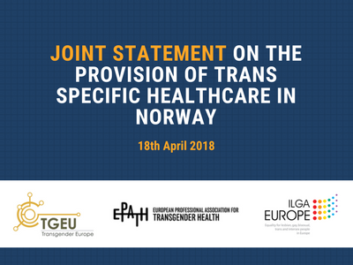Joint Statement on the Provision of Trans Specific Healthcare in Norway

Transgender Europe (TGEU), the Board of the European Professional Association for Transgender Health (EPATH), and ILGA Europe express our serious concern regarding the Norwegian “National Treatment Centre for Transsexualism’s” (NBTS) policy on the provision of trans related healthcare and in particular the statement published by the Centre on 1st April 2018.
We believe that trans people are entitled to healthcare which is accessible, centres the individual, and enables people to make informed treatment choices.
As originally published the announcement on the website of the NBTS stated that, from the 1st of April, the Centre will:
- reject referrals relating to trans people who have started either hormonal or surgical trans specific healthcare before being referred to the service;
- terminate the diagnosis process of trans people who start hormonal or surgical trans specific healthcare before being diagnosed by the NBTS.
The NBTS claims that the decision to introduce this policy is based upon concern that receiving hormonal or surgical trans specific healthcare before diagnosis by the Centre can in some way make it difficult for an accurate diagnosis of “transsexualism” to be made. In effect, the statement suggests that individuals may be misdiagnosed as “transsexual” because they have already accessed certain trans specific healthcare.
This statement is extremely misleading and is based neither on medical research nor on the World Professional Association of Transgender Health’s (WPATH) standards of care (SOC v.7). Such a policy represents an increase in the already restrictive gatekeeping practices carried out by the Centre. It will prevent an even larger proportion of trans people than are already excluded from accessing the healthcare they need. Given that the policy essentially means that anyone in Norway seeking trans related healthcare must go through the Centre it is difficult to interpret this policy as anything other than a way of furthering the monopoly it already has on the provision of trans related healthcare. By sanctioning the refusal of treatment to people who have initiated hormone treatment or have undergone surgery out with the NBTS the policy may be detrimental to the health of trans people who need regular monitoring or follow up care. In particular, we reiterate the concerns raised by Amnesty International in their letter to the Ministry of Health dated 22 March 2013 regarding the possible negative health implications for people who have started hormone treatment if they do not receive the ongoing treatment they require.
The Centre’s general policy of providing treatment only to individuals that meet the requirements of the International Classification of Diseases version 10 (ICD-10) diagnosis of Transsexualism (F64.0) as determined solely by the NBTS is not reflective of current best practice and renders a large proportion of people unable to access any trans related healthcare. Again, this issue was raised by Amnesty International in their letter of 2013 and was comprehensively critiqued by the publicly appointed Expert Group who delivered a report recommending numerous improvements to trans related healthcare provision to the Minister for Health in April 2015.
The WPATH SOC7 state that the function of diagnosis is to determine whether individuals experience gender dysphoria requiring medical intervention such as psychosocial support, hormone therapy or surgery. Recognising the stigmatizing effect of the F64.0 psychiatric diagnosis, and taking into account current medical research, the World Health Organisation, in the draft 11th Revision of the ICD, has
replaced the diagnosis with one entitled “Gender incongruence in adolescents and adulthood” and placed it in a category relating to sexual health. It is therefore recognised that current best practice is to provide trans people with nonpathologizing healthcare by equipping them with all of the information and support they need to make informed treatment choices.
Having ratified the International Covenant on Economic Social and Cultural Rights Norway is bound by Article 12 to provide all citizens with the highest attainable standard of health. Article 2.2 of the Covenant provides that this right must be guaranteed without discrimination, and while it is not explicitly mentioned, the Committee on Economic Social and Cultural Rights has made clear that gender
identity is a prohibited ground of discrimination. It is therefore incumbent on the Norwegian Government to provide all trans people with the care that they need to enable them to enjoy their right to the highest attainable standard of health. The Government showed itself to care a great deal about the human rights of trans people by taking decisive action and reforming gender recognition procedures in line with best practice, and must now do the same in relation to healthcare.
We therefore call on the Ministry of Health to urgently:
- Reject any policy which discriminates against trans people who have started
hormonal or surgical trans specific healthcare before either being referred to
or diagnosed by the NBTS; - Implement a policy for trans related healthcare provision which is in line with
the WPATH SOC7, upcoming ICD-11, international best practice and, at the
very least, the 2015 recommendations of the Expert Group.